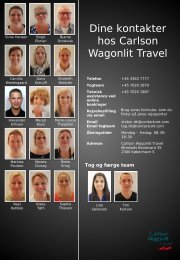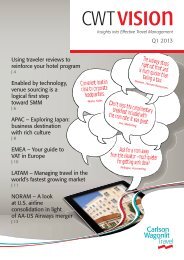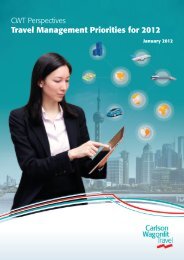CWT Responsible Business Report 2012 - Carlson Wagonlit Travel
CWT Responsible Business Report 2012 - Carlson Wagonlit Travel
CWT Responsible Business Report 2012 - Carlson Wagonlit Travel
- No tags were found...
Create successful ePaper yourself
Turn your PDF publications into a flip-book with our unique Google optimized e-Paper software.
ContentsChapter 6 - <strong>Responsible</strong> Products and Services<strong>2012</strong> <strong>Responsible</strong> <strong>Business</strong> <strong>Report</strong> -Chapter 6<strong>Business</strong> continuity<strong>CWT</strong> <strong>Travel</strong>Stress Index<strong>CWT</strong> Meeting Optimizer<strong>CWT</strong> <strong>Travel</strong> Stress Index<strong>CWT</strong>’s innovative <strong>Travel</strong> Stress Index helps clients improvetraveler well being and increase corporate productivityCompanies are responsiblefor the well being of theiremployees and <strong>CWT</strong> islooking to help clientsaddress the stress thatcan be associated with regularbusiness travel. As part of <strong>CWT</strong>’scontinued focus on business travelers,<strong>CWT</strong> Solutions Group, togetherwith the Global Product Innovationteam, launched the <strong>CWT</strong> <strong>Travel</strong>Stress Index in Q2 2013. The <strong>CWT</strong><strong>Travel</strong> Stress Index seeks to quantifythe cost to the organization of thestress that employees can incur fromtraveling, and use that informationto help buyers make better travelpolicy decisions. Without thisinformation, many organizationsfocus on small savings gained ona short-term basis when they canactually achieve significant ones througha longer-term approach.As of the publication of this report,<strong>CWT</strong> Solutions Group has releasedtwo whitepapers: Stress Triggers for<strong>Business</strong> <strong>Travel</strong>ers (October <strong>2012</strong>) andThe Hidden Costs of <strong>Business</strong> <strong>Travel</strong>(April 2013). In the first study, basedon the responses of 6,000 businesstravelers, <strong>CWT</strong> found three maincategories of stress: lost time, surprisesand routine-breakers.In the second study, leveragingnine data sources (including 15.3 millionair transactions), <strong>CWT</strong> developed analgorithm to quantifiably measure travelstress and its corresponding impact onan organization. The results show thatthe actual lost time (caused by travelrelatedstress) is on average 6.9 hoursper trip. The largest contributions to thislost time arise from flying economyclass on medium and long-haul flights(2.1 hours) and getting to the airport/train station (1.1 hours). The financialequivalent of this 6.9 hours is US$ 662.This type of examination enablesorganizations to understand that beyondthe purely transactional aspect of thetrip, they should recognize businesstravel as a strategic means to grow andcompete effectively in the marketplace.More importantly, business travel has animpact on a company’s most importantasset: its employees. For these reasons,other areas of the organization, such asHuman Resources and <strong>Responsible</strong><strong>Business</strong>, may be involved in makingtravel policy decisions. The <strong>CWT</strong> <strong>Travel</strong>Stress Index, as a decision-making tool,will help our clients assess and adjusttheir travel policies, and move from“travel policy” to “traveler policy.”To learn more,visit the <strong>CWT</strong> SolutionsGroup website atwww.cwt-solutionsgroup.comWith the <strong>Travel</strong> Stress Index, <strong>CWT</strong> offersa different way to look at duty of care,introducing the dimension of people todecisions on travel programs and policywhich today are organized accordingto spend, safety and security and CO 2emissions.Vincent Lebunetel, Senior Director,<strong>CWT</strong> Solutions Group, Europe, Middle East & AfricaCopyright © 2013 <strong>CWT</strong>77





